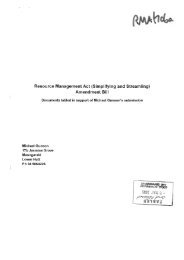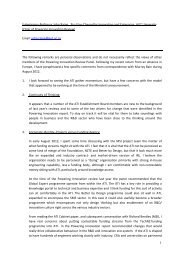Full paper text [PDF 3515k] - New Zealand Parliament
Full paper text [PDF 3515k] - New Zealand Parliament
Full paper text [PDF 3515k] - New Zealand Parliament
Create successful ePaper yourself
Turn your PDF publications into a flip-book with our unique Google optimized e-Paper software.
52<br />
Capitalisation threshold<br />
Individual assets, or groups of assets, are<br />
capitalised if their cost is greater than<br />
$1,000. The value of an individual asset that<br />
is less than $1,000 and is part of a group of<br />
similar assets is capitalised.<br />
Impairment of non-fi nancial assets<br />
Property, plant and equipment, and<br />
intangible assets that have a fi nite useful<br />
life are reviewed for impairment whenever<br />
events or changes in circumstances<br />
indicate that the carrying amount might<br />
not be recoverable. An impairment loss<br />
is recognised for the amount by which<br />
the asset’s carrying amount exceeds its<br />
recoverable amount. The recoverable<br />
amount is the higher of an asset’s fair value<br />
less costs to sell and value in use.<br />
Value in use is the depreciated replacement<br />
cost for an asset where the future economic<br />
benefi ts or service potential of the asset<br />
are not primarily dependent on the<br />
asset’s ability to generate net cash infl ows<br />
and where the Health and Disability<br />
Commissioner would, if deprived of the<br />
asset, replace its remaining future economic<br />
benefi ts or service potential.<br />
If an asset’s carrying amount exceeds its<br />
recoverable amount, the asset is impaired<br />
and the carrying amount is written-down to<br />
the recoverable amount. For revalued assets,<br />
the impairment loss is recognised in other<br />
comprehensive income to the extent that<br />
the impairment loss does not exceed the<br />
amount in the revaluation reserve in equity<br />
for that class of asset. Where that results in<br />
a debit balance in the revaluation reserve,<br />
the balance is recognised in the surplus<br />
or defi cit.<br />
For assets not carried at a revalued amount,<br />
the total impairment loss is recognised in<br />
the surplus or defi cit.<br />
The reversal of an impairment loss on<br />
a revalued asset is credited to other<br />
comprehensive income and increases the<br />
asset revaluation reserve for that class<br />
of asset. However, to the extent that an<br />
impairment loss for that class of asset was<br />
previously recognised in the surplus or<br />
defi cit, a reversal of the impairment loss is<br />
also recognised in the surplus or defi cit.<br />
For assets not carried at a revalued amount,<br />
the reversal of an impairment loss is<br />
recognised in the surplus or defi cit.<br />
Creditors and other payables<br />
Creditors and other payables are noninterest<br />
bearing and are normally settled<br />
on 30-day terms, therefore the carrying<br />
value of creditors and other payables<br />
approximates their fair value.<br />
Employee entitlements<br />
Short-term employee entitlements<br />
Employee entitlements that the Health<br />
and Disability Commissioner expects to be<br />
settled within 12 months of balance date are<br />
measured at undiscounted nominal values<br />
based on accrued entitlements at current<br />
rates of pay.<br />
These include salaries and wages accrued<br />
up to balance date, annual leave earned but<br />
not yet taken at balance date, retiring and<br />
long-service leave entitlements expected to<br />
be settled within 12 months, and sick leave.<br />
Superannuation schemes<br />
Defi ned contribution schemes<br />
Obligations for contributions to Kiwisaver<br />
and the Government Superannuation Fund<br />
are accounted for as defi ned contribution<br />
superannuation schemes and are<br />
recognised as an expense in the statement<br />
of fi nancial performance as incurred.


![Full paper text [PDF 3515k] - New Zealand Parliament](https://img.yumpu.com/11267192/54/500x640/full-paper-text-pdf-3515k-new-zealand-parliament.jpg)



![Full evidence text [PDF 8908k] - New Zealand Parliament](https://img.yumpu.com/14025494/1/184x260/full-evidence-text-pdf-8908k-new-zealand-parliament.jpg?quality=85)
![−3 JUN 2009 IRELEASED] - New Zealand Parliament](https://img.yumpu.com/12829724/1/185x260/3-jun-2009-ireleased-new-zealand-parliament.jpg?quality=85)


![Full evidence text [PDF 9k] - Parliament](https://img.yumpu.com/7938085/1/184x260/full-evidence-text-pdf-9k-parliament.jpg?quality=85)





